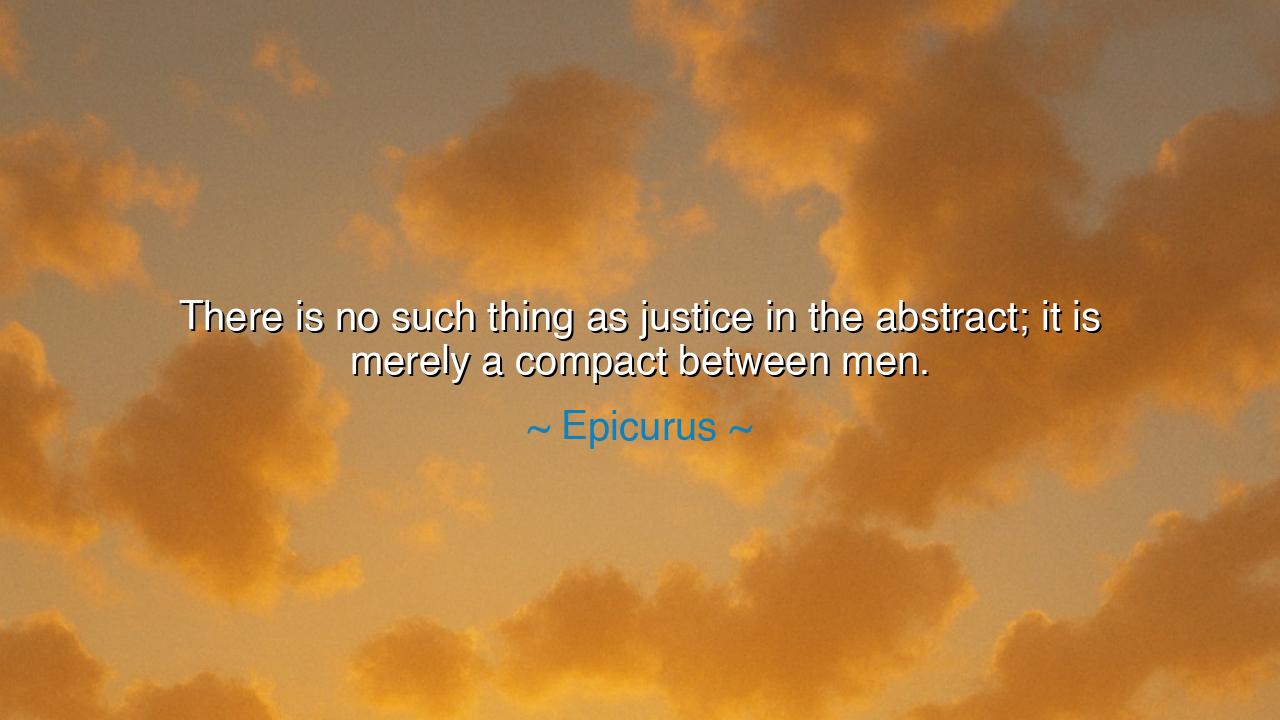
There is no such thing as justice in the abstract; it is merely a






The words of Epicurus, “There is no such thing as justice in the abstract; it is merely a compact between men,” strike like the sound of a temple bell—measured, resonant, and filled with the gravity of human truth. Spoken in the ancient world, yet eternal in meaning, they remind us that justice is not born from the heavens but from the hands of men. Epicurus, that philosopher of peace and clarity, sought to strip away illusion from life. He did not deny the goodness of justice; rather, he sought to define it as it truly is—not an immortal idea carved in stone, but a mutual agreement among mortals to live without harm or fear.
To the ancients, many believed that Justice was divine, that it descended from the gods as a sacred law. But Epicurus, ever the seeker of the natural order, saw that what men called “divine law” changed from city to city, from tribe to tribe. What was justice in Athens might be injustice in Sparta. Therefore, he concluded that justice exists not as a cosmic ideal, but as a living pact—a social understanding to preserve peace and mutual safety. It is born not in the stars, but in the meeting of human minds, when men agree that they will not harm one another for the sake of shared harmony.
The philosopher’s words are not cynical; they are deeply practical and humane. By removing justice from the clouds and placing it upon the earth, Epicurus made it something we could truly understand and protect. If justice is a compact, then it is maintained only through the goodwill and cooperation of those who honor it. This means that justice lives or dies with the spirit of the people. It cannot survive through decrees alone, nor through fear, nor through divine sanction—it survives through trust, through the ongoing effort to keep the balance between freedom and restraint.
Consider the story of Solon of Athens, one of the great lawmakers of antiquity. When Athens fell into chaos—rich against poor, citizen against citizen—Solon did not appeal to the gods for answers. He wrote laws that sought to bring balance between classes, to bind men together in fairness. He freed the enslaved debtor and restrained the greedy noble. His justice was not perfect, but it was practical—it was, as Epicurus might say, a compact made by human reason to ensure stability and peace. And for a time, it worked. The city flourished not because the gods smiled upon it, but because its people chose to honor their agreement.
The wisdom of this teaching also reveals a warning. If justice is a compact, it can be broken. When one party forgets the agreement—when power grows arrogant, or the weak lose faith—justice begins to fade. Nations fall not because the heavens turn away, but because men cease to remember their promise to one another. The fall of Rome itself bore witness to this truth: corruption spread, trust vanished, and the social compact dissolved into ambition and greed. The republic died not by sword, but by betrayal of its own principles.
Yet there is also great hope in Epicurus’s vision. For if justice is made by men, then it can always be remade. It is not a lost relic, but a living bond that can be renewed whenever people return to understanding and compassion. Each generation is called to sign this contract again—not with ink, but with integrity. The meaning of justice changes with time, but its heart remains the same: the preservation of peace through mutual respect.
So let this teaching be passed down: justice is not a gift, but a duty shared among all. Do not wait for the gods or the mighty to define it for you; define it with your actions. Live as one who honors the unseen compact—to harm no one, to seek fairness, to uphold truth. For when justice is kept alive between men, even the smallest city can stand like a fortress of light. But when it is forgotten, even the grandest empire will crumble into dust. As Epicurus teaches, justice is not eternal in the sky, but fragile and sacred in the hearts of men—and it is there that we must protect it, every day.






AAdministratorAdministrator
Welcome, honored guests. Please leave a comment, we will respond soon